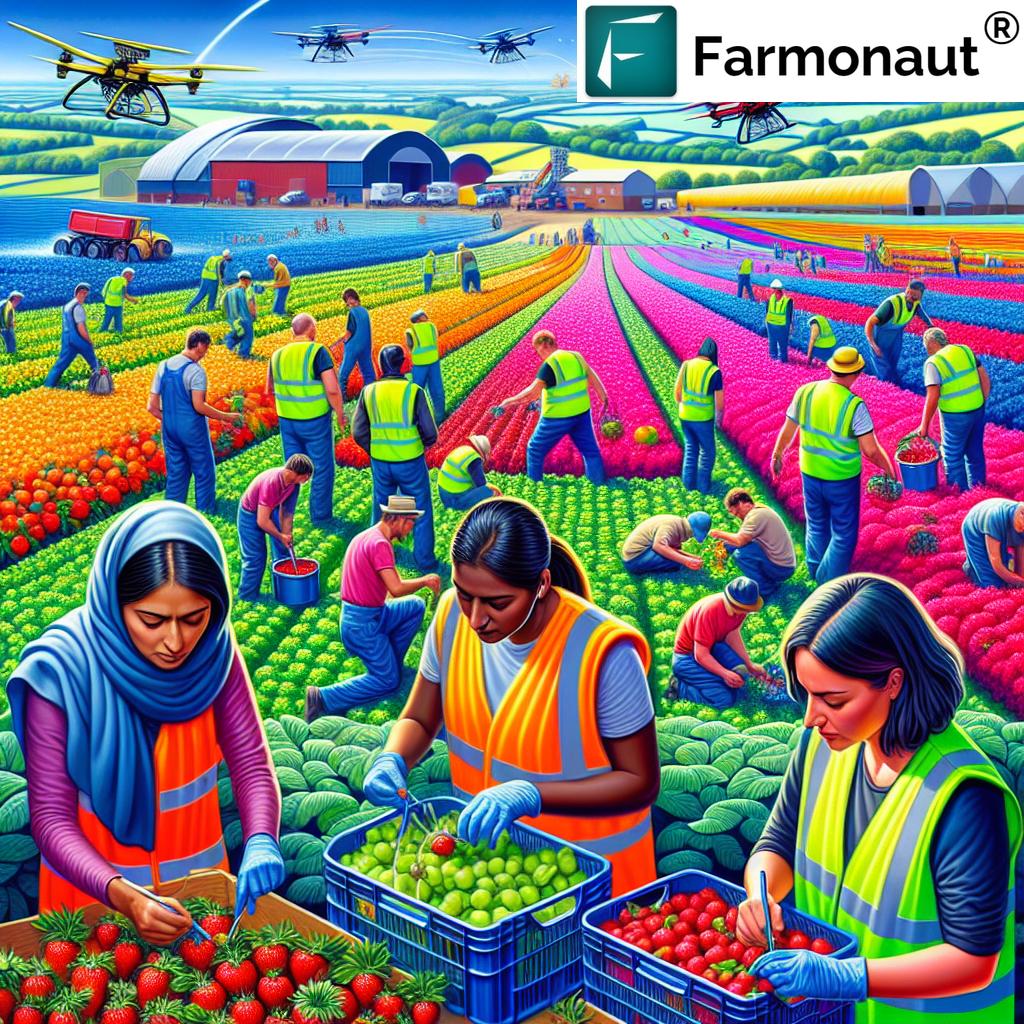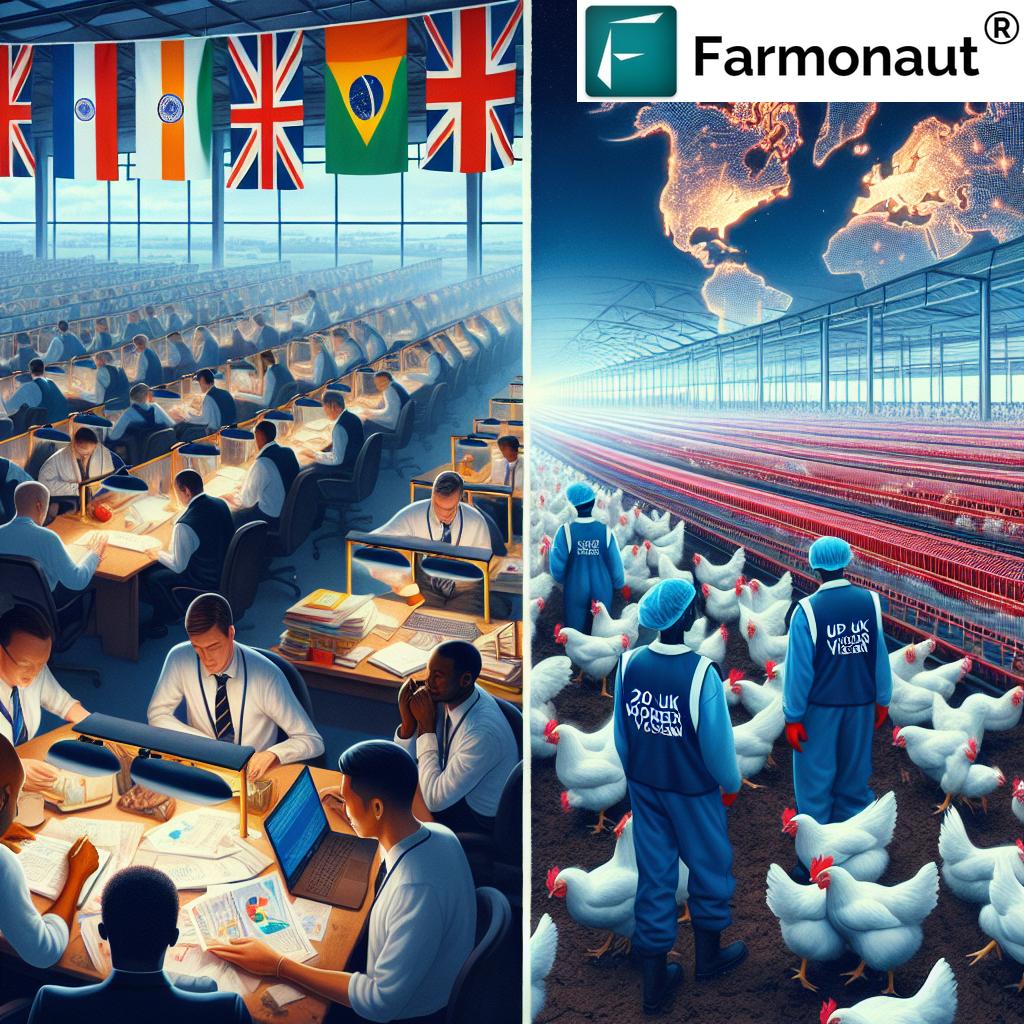Unlocking Opportunity: UK’s Bold Move to Boost Farm Labor with 45,000 Seasonal Worker Visas for 2025

LONDON – In a groundbreaking move set to reshape the landscape of British agriculture employment, the UK government has announced a significant expansion of its seasonal worker visa program for 2025. This bold initiative aims to address labor shortages in the agricultural sector while offering exciting farm labor opportunities UK to international workers.
A Boost for British Agriculture
The UK government’s decision to issue over 45,000 seasonal worker visas UK for 2025 marks a pivotal moment for the nation’s farming industry. This allocation includes:
- 43,000 visas for the horticulture sector jobs UK
- 2,000 visas dedicated to poultry worker visas UK
This strategic move is designed to ensure that British farms have access to the workforce they need to maintain productivity and meet the nation’s food demands.
Opportunities for International Workers
The expansion of the UK seasonal worker visa 2025 program opens up a world of possibilities for international workers seeking unique experiences and skill development. Participants in this program will have the chance to:
- Immerse themselves in British culture
- Gain valuable work experience in a thriving agricultural sector
- Develop new skills in modern farming techniques
- Contribute to the UK’s food security
International farm workers UK will play a crucial role in supporting various aspects of British agriculture, from fruit picking to poultry management.
Horticulture Sector: A Key Focus
The lion’s share of the visa allocation is directed towards the horticulture sector, reflecting its critical importance to the UK economy. Horticulture jobs in Britain are diverse and rewarding, offering workers the chance to engage in:
- Fruit and vegetable harvesting
- Greenhouse operations
- Ornamental plant cultivation
- Landscaping and garden maintenance
This focus on horticulture not only addresses immediate labor needs but also supports the long-term sustainability of the UK’s fresh produce industry.
Poultry Sector: Ensuring Year-Round Production
The allocation of 2,000 visas specifically for poultry sector jobs UK highlights the government’s recognition of this industry’s unique labor requirements. Poultry workers play a vital role in:
- Maintaining bird health and welfare
- Managing feed and nutrition programs
- Ensuring high standards of hygiene and biosecurity
- Supporting year-round production of eggs and poultry meat
This targeted visa allocation will help stabilize the workforce in this essential sector of British agriculture.

Planning for Success: Early Visa Allocation Announcement
The early announcement of the UK visa allocation for seasonal workers for 2025 is a strategic move that brings several benefits:
- Allows farmers to plan their labor needs well in advance
- Provides certainty for recruitment agencies and international workers
- Enables smoother logistics and onboarding processes
- Supports better crop planning and management
This forward-thinking approach demonstrates the government’s commitment to supporting the agricultural sector and ensuring food security.
Enhancing Worker Welfare and Compliance
Alongside the visa allocation, the UK government is implementing measures to enhance UK farm labor compliance and worker welfare. These initiatives include:
- Rigorous compliance checks on farms
- Comprehensive welfare assessments for workers
- Collaboration with international partners to ensure ethical recruitment practices
- Ongoing support and monitoring throughout the workers’ stay in the UK
These measures aim to create a positive and supportive environment for international workers in British agriculture, ensuring their experience is both rewarding and safe.
Explore Farmonaut’s Satellite Weather API
The Application Process
For those interested in applying for a seasonal agriculture work visa, the process involves several key steps:
- Obtaining a job offer from a licensed UK sponsor
- Gathering necessary documentation, including proof of identity and qualifications
- Completing the online visa application
- Attending a visa application center for biometrics
- Awaiting the visa decision
Prospective applicants are encouraged to start the process early to ensure they meet all requirements and deadlines.
Impact on British Farming
The expansion of the seasonal worker visa program is expected to have a significant positive impact on British farming:
- Ensuring crops are harvested at the optimal time
- Maintaining the competitiveness of UK agriculture in global markets
- Supporting rural economies and communities
- Facilitating knowledge exchange between international and local workers
This initiative is a crucial step in addressing the labor challenges faced by the UK agricultural sector in recent years.
Access Farmonaut’s API Developer Docs
Looking Ahead: The Future of UK Agriculture
As the UK continues to evolve its agricultural policies post-Brexit, the seasonal worker visa program plays a pivotal role in shaping the future of farming in Britain. This initiative not only addresses immediate labor needs but also:
- Promotes cultural exchange and international cooperation
- Supports the development of a skilled agricultural workforce
- Encourages innovation and best practices in farming
- Strengthens the UK’s food security and self-sufficiency
The success of this program could serve as a model for other sectors facing similar labor challenges.
Conclusion
The UK’s decision to allocate 45,000 seasonal worker visas for 2025 represents a significant commitment to supporting its agricultural sector and embracing international collaboration. This initiative not only addresses critical labor shortages but also opens up exciting opportunities for workers from around the world to experience life and work in British farms.
As the program unfolds, it will be crucial to monitor its impact on productivity, worker welfare, and the overall health of the UK’s agricultural industry. With careful implementation and ongoing support, this bold move has the potential to strengthen British agriculture and create lasting positive outcomes for both the UK and the international workers who contribute to its success.


